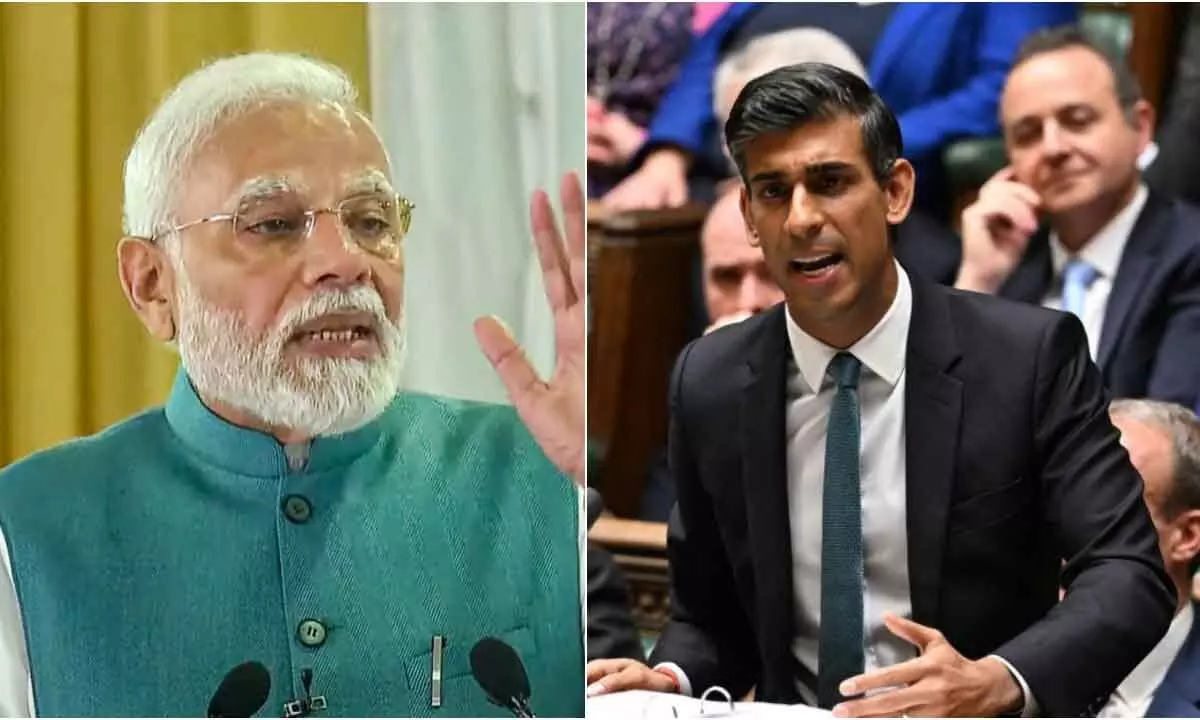Renewed hope on India-UK FTA as Indian origin Sunak heads UK
The deal aims at doubling bilateral trade to $100 bn by 2030 between India and UK
image for illustrative purpose

As the 42-year-old Indian-origin Tory leader Rishi Sunak becomes PM, all of India is hoping that India will get a favourable deal when the FTA is signed. Many opine that Rishi will be a great PM for the nation and to work with India, especially at this time when Britain and India are working on launching the Free Trade Agreement (FTA).
Mr Sunak's main job will be to revive the stalled 'high ambition' FTA - the two sides launched negotiations in January. India expects to increase exports of leather, jewellery, textiles and food products and secure more visas for students and businesses.
The ambitious pact - also aims at doubling bilateral trade to $100bn by 2030. However the deal which was supposed to be signed before Diwali has stalled appears to have run into heavy weather after Indian-origin home secretary Suella Braverman said that it would increase Indian migration to UK at a time when "the largest group of people who overstay are Indian migrants. However Mr Sunak is likely to be strongly committed to the deal with India, which has edged out Britain to become the world's fifth-largest economy. In recent times after a decade of skepticism over free trade deals, India has been signing new agreements with a number of countries to reduce trade barriers, eliminate tariffs and gain preferential access to global markets.
Earlier this year, the country brought into force a comprehensive economic partnership with the UAE and signed an ambitious trade pact with Australia, committing to reduce tariffs by 85 per cent. Advanced negotiations are also under way to sign free trade agreements (FTAs) with the UK and the EU. These deals are expected to cover a range of products and services from textiles to alcohol, automobiles, pharmaceuticals as well as subjects like labour movement, intellectual property enforcement and data protection. The re-launch of FTA negotiations with the EU after a protracted wait was reflective of a 'new India' which wishes to engage with the developed world as friends, from a position of fairness. This renewed zeal marks a sharp departure from India's trepidation about trade liberalisation over much of the last decade.
In 2019, India pulled out of the Regional Comprehensive Economic Partnership (RCEP), which was said to be the world's largest trade agreement between China and 14 other Asian countries, after being part of the negotiations for seven years. India was concerned that the agreement would reduce duties on imported goods by 80-90 per cent, and further widen India's large trade imbalance with China, exposing domestic producers to greater foreign competition. India's large middle class makes it an attractive destination for foreign companies. The government's assessment of India's existing FTAs and preferential trade pacts isn't favourable either.
According to NITI Aayog, the public policy think tank of India, while bilateral trade with partner countries like Japan, South Korea and the ASEAN region increased following the signing of trade deals, imports rose more sharply than exports, leading to 'unfavourable gains' to India's trade partners. India's approach this time is to achieve a 'fair and balanced' FTA with complementary economies, focused less on competition and more on collaboration. But achieving this balance might be easier said than done. Experts say that a balanced approach is needed to ensure small Indian business is protected.
But as India fast-tracks free-trade negotiations with countries like the UK and the EU, there are concerns about more competition from cheaper, imported brands, in case of wines, just as the sector is on the cusp of maturing. Textile and apparel firms, which recorded the highest ever exports in the last financial year, are enthused by the prospect of lower tariffs on their goods. Apparel manufacturers have also been losing business to countries such as Vietnam which recently ratified its FTA with the EU. For them, the imperative to act is greater.
It's much cheaper for European companies to place orders with Vietnamese vendors because they don't have to pay duties, whereas duties are between 9 per cent and 16 per cent for imports from India. For India and its partners, the reasons behind the renewed interest in these trade talks are as much strategic as they are economic. India's annual merchandise exports crossing the $400 billion mark in the last fiscal year - a 40 per cent annual jump - has reduced the hesitation around giving additional market access. But equally, as countries like Britain look to expand supply chains towards the Indo-Pacific in a post-Brexit world, and global firms adopt a strategy in which they avoid investing only in China and diversify their businesses to alternative markets, It is a rare opportunity for India to become globally integrated.

